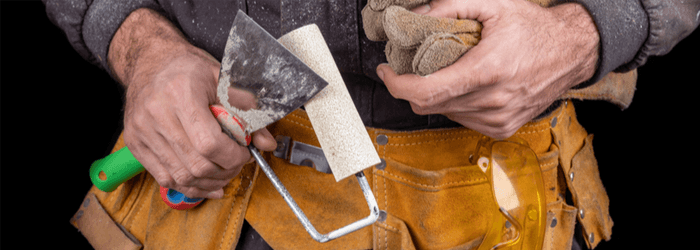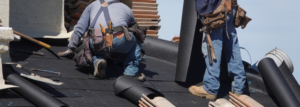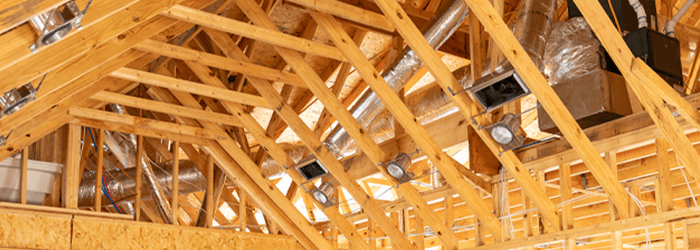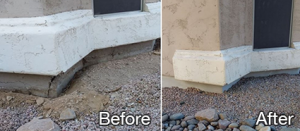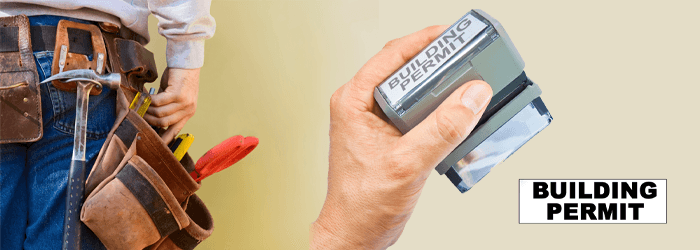THESE FOUR PROJECTS ARE NOT DIY JOBS
So, you are ready to get your weekend warrior on and tackle some home improvement projects. That’s great! But before you order materials and secure your toolbelt, Rosie highly cautions against four projects that should never be a DIY. These should be left to licensed professionals:
Roofing
If you are not acrophobic (afraid of heights), you can certainly inspect your own roof. Here are some tips to help you do just that. However, replacing tiles or shingles should be left to the professionals.
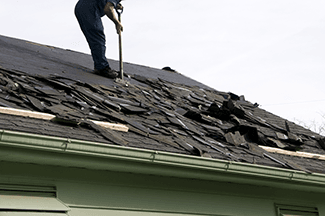
Safety
The most important reason of all — safety. According to the American Academy of Orthopedic Surgeons, every year 500,000 people are treated for ladder-related injuries and approximately 300 of these incidents prove to be fatal. If you manage to get on the roof, you can easily slip off. Need more reasons?
There are many unknowns on your roof. Do you know how to spot rotten beams or shingles that could be moldy and/or have holes that could easily cause serious injuries? Professional, experienced roofers know how to properly walk on roofs, spot dangers, and operate power tools while performing a delicate balancing act. If those dangers are present, you need a professional to fix them, especially the mold.
Workmanship
Replacing a few shingles and tiles is tougher than you may think.
If you aren’t skilled or experienced with nailing down shingles, you could create tiny holes that take on water and lead to major damage.
Replacing a roof or repairing damage requires skill and experience. A skilled professional knows how to install tiles and shingles properly. An improperly installed roof looks awful and can damage other parts of your home, which can decrease the value and resale of your home.
Replacing the HVAC Unit
We’re not talking about a simple window AC unit. We’re talking 5-tons, here.
Safety
Hmm, what could possibly go wrong in this scenario? Being crushed by the unit, electrocution, inhalation of fumes, a roof collapse.
HVAC installation is very technical and complicated. Installers must be skilled in electrical, plumbing, and welding. They also need experience handling toxic gases and understanding pressure, temperature, airflow, and specialized equipment.
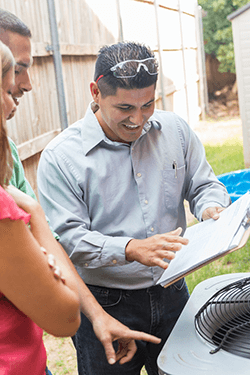
Workmanship
An experienced HVAC contractor will ensure you get a unit that is the right size for your home. Properly installed, it will provide you with maximum comfort and energy efficiency. Matching the ductwork to the new unit is quite technical and requires a professional with HVAC knowledge and skill.
Installation involves properly balancing and pairing it with an appropriate thermostat to maximize its energy savings. Google “how-to” all you want. This job is way too big, complicated, and crucial to the life of your home and your comfort to do yourself.
Modifying A Load-Bearing Wall
This DIY job is a HARD NO for Rosie.
Safety
The safety of the home’s occupants and the structural integrity of the building are at stake. You don’t know what is behind the drywall. Because a load-bearing wall provides structural support for weight loads above the wall, it cannot be removed without a new structure taking its place. Therefore, removing a load-bearing wall is a project that requires the services of a licensed contractor, not a handyman , an Arizona Registrar of Contractors (AZ ROC) licensed, bonded, and insured contractor. A professional remodeling contractor will know what to look for, how to do it, and correctly remedy problems that arise.
Building Your Own Pool
In 2020, it became increasingly difficult to find materials to build a pool and find a contractor who could get it finished in a matter of months. Some folks didn’t want to wait and started digging. Good luck. Rosie’s neighbor just built a DIY pool. It took longer than it would have had he used a professional builder. Why? Because the subcontractors that would have helped him were busy with the customers of the professional pool builders.
Safety
There are so many safety issues such as drowning, leaks, electrical malfunctions, settling, and countless others that this DIY job is also a HARD NO for Rosie. Still, need more reasons?
Workmanship
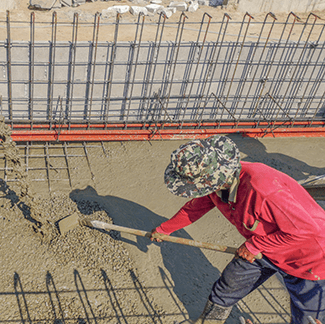
Do you understand how long the shotcrete needs to cure? Don’t know what shotcrete is? What about coping? And we don’t mean how you will cope with the migraine headaches of building your own pool.
“Many DIY pools are built as ‘side work’ by employees of established pool builders,” says Manny Sanchez, President, Pool & Hot Tub Alliance Southern Arizona Chapter. “Most of the time, these people are unlicensed.”
Talk about digging yourself into a hole. Employees doing side work under their employer’s license is illegal.
There are many tools and specific materials required to build a pool. Many of which are probably not in your tool shed and will likely never be needed again. Waste of money!
Additionally, “In today’s climate, they (DIYers) will have a hard time getting products,” says Sanchez, President. “Product nowadays is on allocation to those who have purchase history. If you didn’t buy it before, it will be difficult to buy it now.”
And if these reasons are not enough, the building codes in some municipalities require the work to be done by a professional contractor.
So, book a staycation at a resort with a big pool and get on the professional pool builder’s schedule. Save the Excedrin for another day.
Other Considerations
Pricing
Doing it yourself is not necessarily cheaper. Sanchez says most contractors have their own tiered price list. Meaning the builder gets a better price than the homeowner. “The homeowner price is typically more and close to what a builder would have charged for it anyway.”
Permits
A city permit ensures that everything has been checked and meets codes for safety. A city building inspector will look at your plans and advise you if your project doesn’t live up to city codes for safety and soundness. The inspector will visit your home before, during, or after you’ve done the work—the bigger the job, the more visits you’ll get—to ensure that the products you’re using are rated for fire safety, that any work involving electricity or gas complies with regulations, and you are not creating safety or structural problems.
For example, modifications to a load-bearing wall where electrical or plumbing needs to be relocated require a permit. Plus, you must use a professional contractor licensed by the Arizona Registrar of Contractors.
As a DIYer, you go through the permit process alone, and it can be complicated, confusing, and frustrating. It may take longer for your DIY project to pass the inspections because of the workmanship and construction knowledge involved.
Warranties

By tackling these projects yourself, you will have likely voided the manufacturer’s warranty on the products. If there is a defect with the products, you can’t get your money back.
“Warranties are typically void when dealing with weekend warriors,” says Sanchez, “You have no recourse on your transaction.”
Insurance
If you or someone gets injured while working on your DIY project, it is reported to your home insurance company. This can cause many legal and financial troubles for everyone involved.
The roof protects your home, and its condition plays a big part in determining your eligibility for home insurance. If your insurance company learns you installed or repaired it yourself and your home’s structural integrity is compromised, they may cancel your policy and refuse to insure you again. Once one company denies you insurance, getting another company to insure you is next to impossible.
Is It Worth It?
Even if you buy the right supplies and research how to do the project, these jobs are best left to the professionals. It can be easy to make a mistake that can turn into a disaster. By that point, you will have to hire a professional to fix it. Now, you are paying for the DIY and the professional expenses.
While you may save a few dollars in the beginning, it could end up costing you far more down the line than if you hired a professional for installation or repair in the first place.
###
PODCAST
There are home projects you can do yourself, but as we discuss, there are at least 4 we recommend you should not do and we include the reasons why to avoid them. Plus listeners call in about their own do-it-yourself mishaps and tales of caution.
Photo Credit:
- Shutterstock

